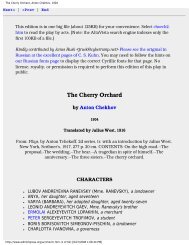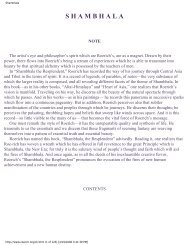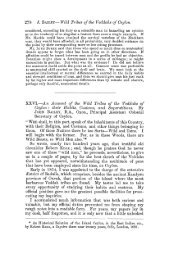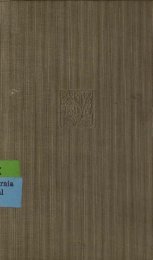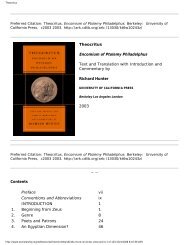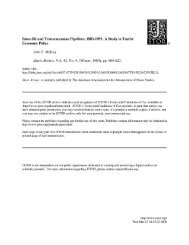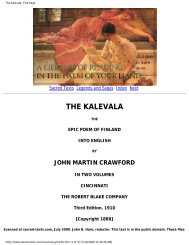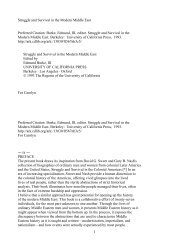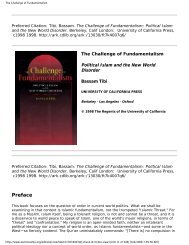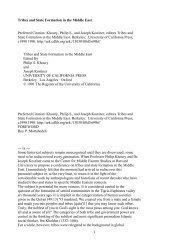Between Two Worlds Kafadar.pdf
Between Two Worlds Kafadar.pdf
Between Two Worlds Kafadar.pdf
Create successful ePaper yourself
Turn your PDF publications into a flip-book with our unique Google optimized e-Paper software.
Imparatorlugunda * Bir Iskan * ve Kolonizasyon Metodu Olarak Vakiflar ve<br />
Temlikler," Vakiflar Dergisi 2(1942):279-386, selected primarily documents<br />
related to dervishes and ahis * , excluding many that dealt with the fakihs * .<br />
It seems, on the basis of the later publication, that in the generations of<br />
Osman and Orhan * , more land was given to fakihs * than to either dervishes or<br />
ahis * . Though "fakih * " literally means a jurisconsult, it implied more of an<br />
imam (as prayer leader) than a juridical figure in the context of western<br />
Anatolia in the late-thirteenth and fourteenth centuries, but looking at the<br />
example of Tursun Fakih * some of these figures, possibly those who had a more<br />
impressive education, may also have played a consultative role in<br />
legal-administrative matters. On the "fakih"s * , also see Köprülü, Islam in<br />
Anatolia, 28.<br />
137. It would be too much of a digression to discuss the second point in detail<br />
here. That discussion must await the future publication of the "YF menakib * "<br />
that I have edited experimentally through a comparison of the chronicle of Apz<br />
with the anonymous ones, basically following the lead given by Ménage a long<br />
time ago. A similar experiment was recently published in Greek translation by E.<br />
Zachariadon (Athens, 1992). My basic point is that the critical passages are<br />
used by the compilers of the different chronicles not randomly but within the<br />
framework of a conscious editorial policy.<br />
138. The use of this word indicates that here the blame is placed squarely on<br />
the Ottoman rulers, not on the ruling elite in general.<br />
139. Anonymous, Tevarih-i * Al-i * `Osman * (see Die altosmanischen anonymen<br />
Chroniken, part 1, ed. E Giese [Breslau, 1922]). Passages translated in B.<br />
Lewis, ed. and trans., Islam from the Prophet Muhammad to the Capture of<br />
Constantinople, vol. 1, Politics and War (New York, 1974), 135-41.<br />
140. The YF-Apz narrative, for instance, describes the meager inheritance left<br />
by Osman Beg with great admiration: Apz, ed. Giese, 34.<br />
141. Anonymous, Tevarih * , in Islam from the Prophet Muhammad to the Capture of<br />
Constantinople, trans. B. Lewis, 142.<br />
142. See Ernest Gellner's discussion of the relevance of the Ibn Khaldunian *<br />
paradigm in dealing with the Ottoman experiment in his "Flux and Reflux in the<br />
Faith of Men," in his Muslim Society (Cambridge, 1980), 73-77; and idem,<br />
"Tribalism and the State in the Middle East," in TSF, 109-26. It is true that in<br />
terms of its longevity, the Ottoman Empire does not conform to that paradigm,<br />
but a closer look reveals that Ottoman history is beset with the general rhythm<br />
of tribal-societies-turned-empire-builders as described by Ibn Khaldun * ; and<br />
later Ottoman intellectuals, once they discovered Ibn Khaldun * , appreciated<br />
the relevance of his theory as addressing a phenomenon much more universal than<br />
the Arabian and North African states that he took as the basis of his<br />
theorizing. See Cornell Fleischer, "Royal Authority, Dynastic Cyclism, and 'Ibn<br />
Khaldunism' in Sixteenth-Century Ottoman Letters," Journal of Asian and African<br />
Studies 18(1983):198-220. The longevity can be explained within that paradigm<br />
(as an exception that ultimately confirms the rule) by the bold initiative of<br />
the House of Osman in creating an unprecedentedly sophisticated system of an<br />
artificial but cohesive household (the kapikullart * , often erroneously<br />
translated as "the sultan's slaves") just when the tribal/warrior solidarity, or<br />
`asabiyya * , was waning. For Ibn Khaldun's * views on the "slave soldier''<br />
phenomenon, see David Ayalon, "Mamlukiyyat * ," Jerusalem Studies in Arabic and<br />
159



